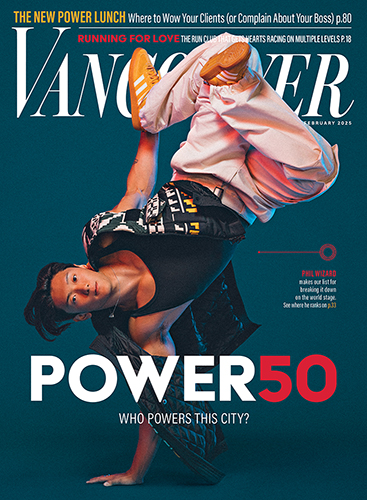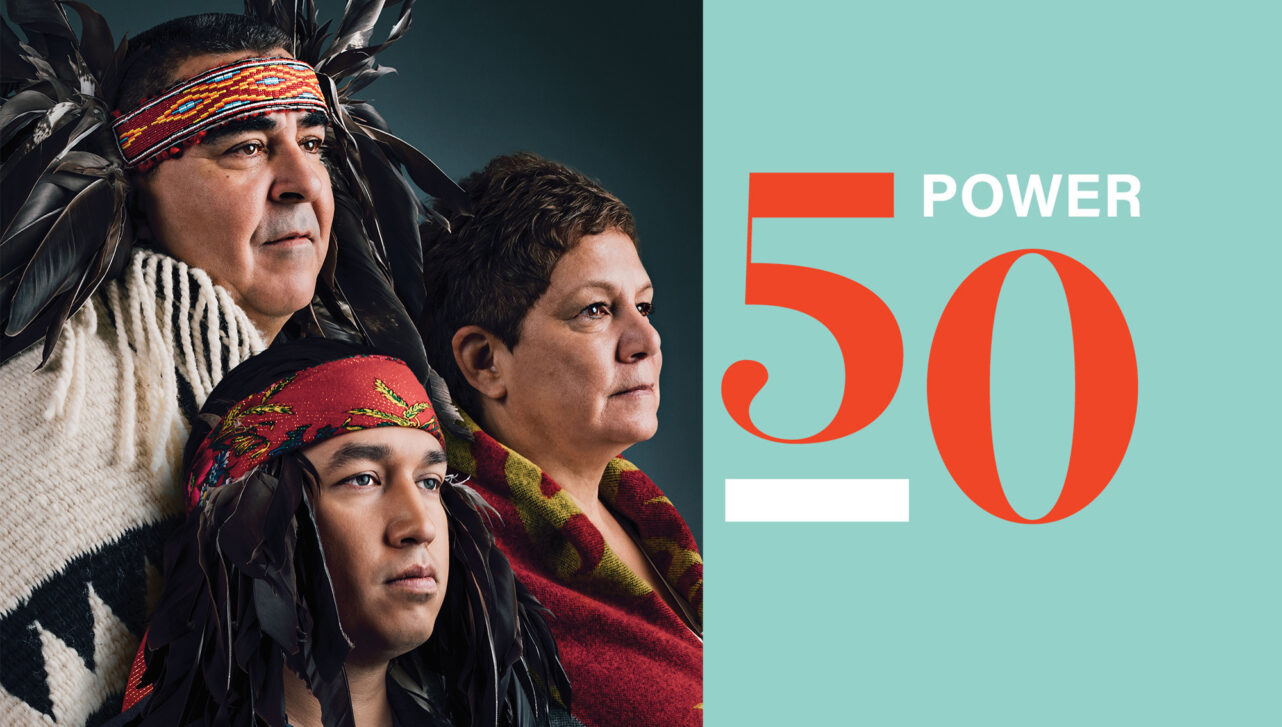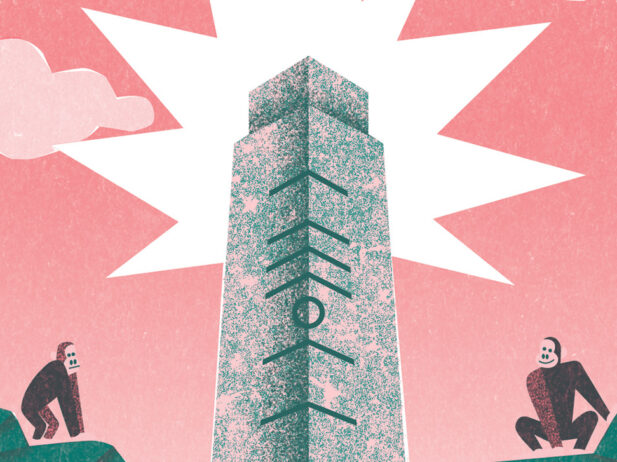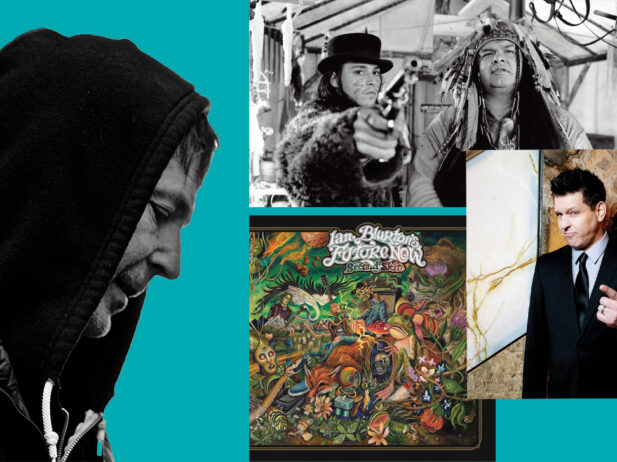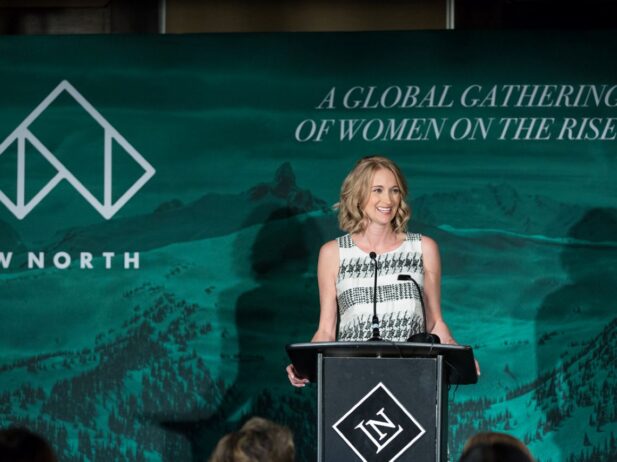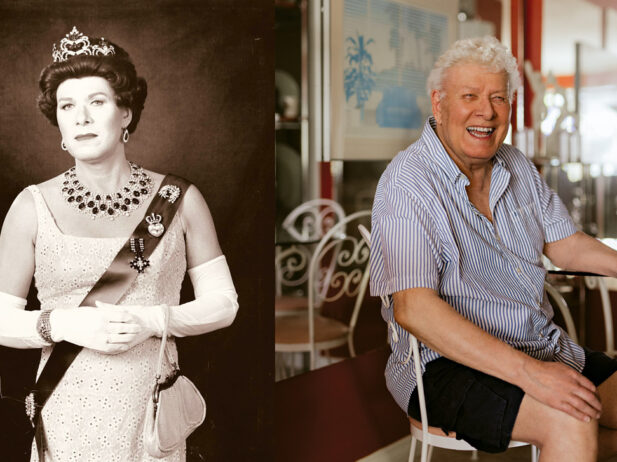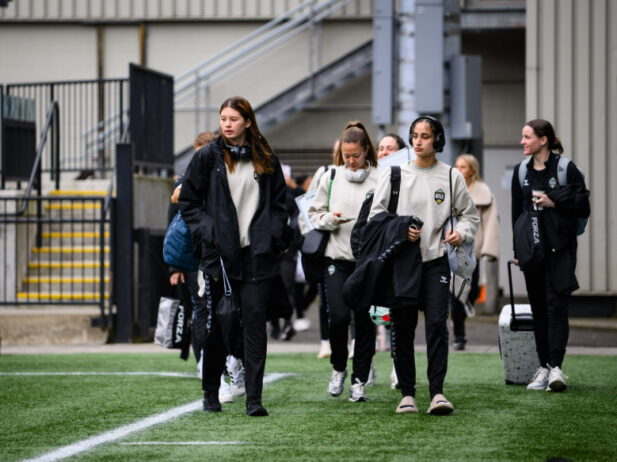Though 2021 proved to be a year unlike any other, one thing remained reassuringly unchanged: the fact that during the course of determining our annual Power 50 list, someone, inevitably, will ask the question, “What is power?” Pandemic or no pandemic, the answer is always slightly hard to pin down—but damned if we don’t try anyway. Generally speaking, we like to define power as impactful and influential, but power, in 2022, seems to lie less often in the CEO office—although the global influence of Vancouver’s tech and resource industries can’t be ignored—and is found instead among those who use their platforms to uplift others. To be powerful today is to be generous, to wield one’s impact with grace and to effect change on scales large and small. So here, on the tail of an undefinable year, we’re pleased to present a list that’s one of a kind: introducing the 2022 Power 50.
Vanmag’s 2022 Power 50 List
Jump to:
Numbers 1 to 10
Numbers 11 to 20
Numbers 21 to 30
Numbers 31 to 40
Numbers 41 to 50

1. Musqueam Band, Squamish Nation and Tsleil-Waututh Nation
Previously (as MST Development Corporation) #6, 2020
Call it a sign of the times. Last July, Vancouver city council agreed to rename Trutch Street after receiving a request from Chief Wayne Sparrow on behalf of the Musqueam people. Joseph Trutch was B.C.’s first lieutenant governor and helped bring the province into Confederation—but he was also “a racist and the chief architect of racist policies which inflected immense and long-standing harm to First Nations People,” as the unanimously passed motion read. The street will soon get a new name chosen by the Musqueam.
In 2021, the influence of the First Nations who have lived here since long before Vancouver existed—the Musqueam, Squamish and Tsleil-Waututh—could be seen far beyond decolonization efforts. It could be seen in revamped plans for the new Vancouver Art Gallery building, announced in November, which included an Indigenous-led design—something lacking from the original plan—with local artists Debra Sparrow, Chepximiya Siyam’ Janice George, Skwetsimeltxw Willard “Buddy” Joseph and Angela George engaging with the gallery and its architects, Herzog and de Meuron. And, with the Lil’wat Nation, they’ll be steering the first Indigenous-led bid to host the 2030 Olympic Games in Vancouver and Whistler.
And within the next decade, the Indigenous imprint will be seen across the region. MST Development Corporation—the for-profit development arm of the Musqueam, Squamish and Tsleil-Waututh Nations—is partnering with Concord Pacific on the redeveloped St. Paul’s Hospital site. It’s helping to build 9,000 homes at Jericho Lands. And through a memorandum of understanding with the city and UBC, MST has committed to help extend the Broadway subway line to the university’s Point Grey campus. And that’s not including projects outside MST’s purview, like the Squamish-led Seʼnákw development in Kits (6,900-plus proposed homes) or the Musqueam and Tsleil-Waututh site near BCIT (with 5,000 proposed homes and a new film studio).
MST has given First Nations in Vancouver tremendous leverage with all three levels of government—including, yes, the power to rename streets. But as one of our panellists explained, reconciliation is about more than new street signs: “It’s about the process of changing names, which invites a conversation and opens up a dialogue—and presents an opportunity for a new story to be told.”
2. Dr. Penny Ballem
Executive Lead for B.C.’s COVID-19 Immunization Efforts; Board Chair, Vancouver Coastal Health
Previously #13, 2020
We were due for some good news in 2021, and we got a helping of it in the form of COVID-19 vaccines. Rolling out the doses proved challenging in most jurisdictions around the world, and Vancouver wasn’t an exception. But Ballem, the former deputy health minister who was recruited by the Province of B.C. to steer its vaccine rollout, rolled with the jabs like Muhammad Ali, recruiting some 1,400 laid-off hospitality and tourism workers to help with non-clinical work at mass vaccination clinics. There were lapses, like failing to deliver some 200 doses to the Nuxalk Nation in central B.C. For the most part, though, a matter of actual life and death was capably handled.
3. John Horgan
Premier of B.C.
Previously #2, 2020
After helping his party dominate an election like it never had previously, Horgan and his tight-knit inner circle presided over a few controversies, including the Fairy Creek and Wet’suwet’en blockades and an initiative to impose a fee on freedom-of-information requests. But while the premier’s popularity took a polling hit, it still ranked high among his peers—throat cancer be damned. And the majority he holds (plus a flailing BC Liberal Party) will allow him to continue doing whatever he wishes, like a newly announced five days of sick leave for all workers.

4. Tamara Vrooman
CEO, Vancouver International Airport/SFU Chancellor
Previously #7, 2020
After taking the top job at Vancity Credit Union in 2007 right before the global financial collapse, corporate Vancouver’s favourite fixer took the helm of YVR a few months after the pandemic. So far, the reign has been one of sober evaluation, including the tough choice to temporarily halt some of the corporation’s expansion efforts. One has to assume the call to institute COVID testing at the airport was a touch easier. Smooth sailing might be an exaggeration, but at the very least the skies are opening up. YVR saw over a million combined arrivals and departures in August of this year—the first time it had even come close to the mark since March 2020.
5. Darren Entwistle and Juggy Sihota
President and CEO + VP, Consumer Health, Telus
Previously #4, 2020; #4, 2019
Even the pandemic couldn’t stop Telus from once again bringing in more revenue than any other company in the province. One of the major drivers of that was Telus Health, which saw double-digit revenue growth under Sihota’s steady hand. The department has seen around one million new virtual customers in the calendar year, representing a 64 percent increase over last year. Meanwhile, longtime Telus president and CEO Entwistle continues to pursue the principles of social capitalism, including a recent $1 million toward flood and mudslide relief in B.C.
6. David Eby
Attorney General and Minister Responsible for Housing
Previously #23, 2020
Horgan kept the power close when he gave Selina Robinson (#14) the finance minister post and handed over the housing file to the already very busy Eby. So far, Eby has fought hard for BC Housing-supported projects around the province, including those in Port Moody and Penticton. He also promised to shutter homeless camps in Vancouver and Victoria and subsequently find housing for their residents. Eby was able to support those working on the ground to get it done—something politicians of the past didn’t or couldn’t do.

7. Terry Hui
CEO, Concord Pacific
Previously #16, 2020
It might be the relative calm before the storm for Concord Pacific in Vancouver, but the storm is brewing. The developer will soon be bringing the 1.8-million-square-foot Quantum Park to life on the former Molson Brewery grounds on Burrard. It’s also purchased the St. Paul’s Hospital site (for $850 million) and has massive projects in many suburbs, like a new tower in Metrotown that will be Metro Vancouver’s tallest. That project will include the world’s largest bike amenity, part of Concord’s push toward sustainable urban infrastructure. The fate of another massive swath of land—the Plaza of Nations site—is unknown, as Hui and Singaporean billionaire Oei Hong Leong engage in a legal battle.

8. Aquilini Family
Aquilini Investment Group
Previously #10, 2020
The Vancouver Canucks can be aptly summed up in Francesco Aquilini’s recent tweet: “Frustrating night.”A thorough house cleaning (new coach, new GM) looks to be turning the team’s fortunes around— but it remains to be seen how the resurgent COVID will hamper ticket sales going forward. It’s a good thing “Aqua Man”—as some fans call him—has plenty of other places to turn his attention, including his family’s restaurants, hotels and numerous other ventures, like its working relationship with the MST Development Corporation. Astoundingly, the cutthroat business acumen the family has become known for is finally taking hold with the Canucks.

9. Brandt Louie
CEO, H.Y. Louie and London Drugs
Previously #7, 2020
Household names producing household items is the name of the game for the bowtie-adorned Louie, who oversees both London Drugs and IGA. Usually preferring to keep a low profile, Louie has seen a year of speaking out, as he penned an editorial in the Vancouver Sun on how COVID has amplified anti-Asian racism and delivered a keynote speech at the Youth Forum for Asian Representation. London Drugs may have lost thousands of dollars of merchandise in flood-related shipping container mishaps, but for the fourth-biggest employer in B.C., it’s a relative drop in the bucket.
10. Mike Farnworth
Public safety minister and deputy premier
NEW
It wasn’t a shock when the premier appointed Farnworth as deputy premier while the big boss dealt with the fallout of being diagnosed with throat cancer. The most experienced NDP MLA in government, Farnworth has also stickhandled public safety—a contentious file when certain restaurants and businesses refuse to engage with its very concept. But the reviews haven’t been all kind, with the province taking heat for not doing enough to warn residents of the extreme weather that wiped out communities.
11. Jim Pattison and Glen Clark
CEO/President + COO, Pattison Group
Previously #15, 2020
Pattison’s empire saw a big increase in revenue during the pandemic, as grocery stores like Save On and Buy Low thrived and forestry giant Canfor rode lumber prices to record operating income. He also continued to pour money into philanthropic endeavours and was vocal about both the urgency of climate change and the shortsightedness of federal proposals to tax the wealthy (he thinks it will only result in people and companies fleeing for the U.S.). It’s good to know that, at age 93, both sides of his mouth are working. Clark remains one of the rare B.C. business leaders with NDP ties and is well positioned to lead Pattison Group into the future.

12. Adrian Dix and Dr. Bonnie Henry
Health Minister + Provincial Health Officer
Previously #3, 2020; #1, 2020
Though many optimists hoped that 2021 would mean the end of pandemic protocol, life had other plans. And through vaccine rollouts, second- (and third- and fourth-) wave spikes, school re-openings and the endless tussles over mask mandates, Dix and Henry did their best to hold down the fort—a seemingly thankless and gruelling job without end. But their steadfast presence offered a comforting assurance during a topsy-turvy time. Dix is the no-emotion voice of the pandemic, expressing condolences over deaths, announcing hospitalization and surgery numbers endlessly (it’s his ministry that has to keep adjusting the balance of what they can do to keep surgeries going); Henry is the one taking the flak for lose-lose decisions, even as everyone continues to hang on to her every word. We may not have known how any week would go, but we could count on this dry, dutiful duo to explain it to us calmly and patiently.

13. Frank Giustra
Multiple Industries
Previously #12, 2020
Is it a Power 50 list without Frank Giustra? With his fingers in a range of fascinatingly diverse pies, billionaire Giustra quietly continues his reign of influence in the city. (Plus, he kicked off the year suing Twitter for defamation—how’s that for power?) While he’s spending most of his time these days on philanthropic efforts (chief concerns including agriculture and human rights), his mining interests, Thunderbird Entertainment Group and private equity investments continue to churn out the big bucks and impact both our resource and entertainment economies.

14. Selina Robinson
Provincial Finance Minister
NEW
It’s going to be Robinson steering the province through the difficult post-COVID economy. As a key member of Horgan’s now-powerful inner circle, she’s in control of one of B.C.’s most pivotal jobs. After all, the NDP government’s previous decisions have had big impacts on the Lower Mainland—from temporarily eliminating the school tax for businesses to deciding how federal money should be distributed to cities. The flipside? She’s the one who has to defend spending decisions and face criticisms about shortfalls, which will be many as everyone fights for post-COVID dollars.

15. Bob Rennie
Rennie Group
Previously #11, 2020
This list is mostly made up of pods: there’s developers over here, politics over there, arts on this side and activists on the other and, for the most part, never the twain shall meet. Which is why Rennie—capable of being named to the list under numerous different pillars—is such an anomaly: he knows everyone. His gravitas on the world art scene (he’s a trustee with the Art Institute of Chicago and president at the Tate Americas Foundation) continues to bring the international glow to our often-regional scene. (The Barkley Hendricks/Lorna Simpson show at his Rennie Museum garnered a lot of global buzz.) And on the bill-paying side, his Rennie Group is riding the continued wave of COVID exuberance, as is his growing real estate brokerage.

16. Anne Naser
President and CEO, WorkSafeBC
NEW
In the thick of the pandemic, it became WorkSafe’s job, for the first time ever, to enforce public-health orders instead of just the usual steel-toed-boots type things—and, suddenly, CEO Naser had a big, big responsibility on her hands. But she stepped up to the plate, and soon had government admirers applauding her even-handed approach to safety and wellness. Insiders say that her work was invaluable in keeping as many businesses open as possible while continuing to protect workers—an almost-impossible balancing act that Naser helped pull off.

17. Ian Gillespie
Founder, Westbank
Previously #21, 2019
There are bigger developers in town, and there are probably more profitable ones, too. But anyone who’s caught a glimpse of Vancouver House at just the right angle from Fairview Slopes or taken the time to really look at the models for the complete reimagination of an entire sector of the city known as Oakridge knows there are no more ambitious ones. Gillespie’s now-signature mix of international architect and “important” public art has become so familiar to us that it frequently elicits eye rolls—he gets more love in his other hubs of Toronto and Tokyo than he does here—but his enviable connections at all levels of government and his quiet participation with the Squamish Nation in the Seńákw development on Burrard mean his influence in the city will be around for a long while.

18. Geoff Meggs
Chief of Staff, BC NDP
Previously #22, 2020
Meggs helped orchestrate the risky provincial COVID election that succeeded beyond almost anyone’s wildest dreams (which wasn’t easy—just ask Justin Trudeau). Not only are the BC Liberals in shambles, but in Meggs’s own party, anyone who posed a possible challenge to Horgan’s authority has either been brought into the inner circle (see Eby, David, #6) or banished to the forgotten back benches. The result is that the next few years will see an unprecedented ability for a small number of individuals—all vetted by Meggs—to make huge decisions on what B.C. will look like going forward.

19. Michael Audain
Chair, Polygon Homes
Previously #38, 2019
Even before Audain and his wife, Yoshiko Karasawa, donated $100 million to the VAG—the largest gift to an art gallery in Canadian history—he was a mainstay on this list. Initially it was for his helming of Polygon Homes, one of the largest and most successful multi-family developers in the province, but as he transitioned away from the day-to-day operations, Audain’s philanthropy kicked into overdrive. He established the Grizzly Bear Foundation several years back, but the visual arts have been his main beneficiary, with dozens of galleries and museums benefitting from his large largesse. In 2016 it was assumed that the funding and opening of the Audain Art Museum in Whistler would be his crowning achievement in philanthropy, but last year’s VAG gift shows that the arts’ greatest benefactor ain’t done just yet.
20. Carol Lee
Co-founder and Chair, Vancouver Chinatown Foundation
Previously #28, 2019
Restaurateur and entrepreneur Lee has long been a champion of Chinatown and cultural revitalization efforts, but the opening of the Chinatown Storytelling Centre in November was a tremendous step forward. The stunning new space shares the voices of 150 Chinese immigrants, with ongoing stories, immersive exhibits and archival films that spotlight adversity, resilience and community. Last year also saw the beginnings of construction on 58 West Hastings, the Downtown Eastside’s largest social housing project, spearheaded by Lee. When completed, the project will have 230 units and space for wellness, life skills and mentoring programs. She’s making a big impact, and we’re not the only ones that think so—she was one of 16 Canadians inducted to the Order of British Columbia in 2021.
21. David Negrin
CEO, MST Development Corporation
New
While Negrin’s name may not pop up too often in the news,
insiders credit him with executing the nitty-gritty details of the MST Development Corporation’s very busy action plan. Behind the scenes, Negrin (who cut his teeth with Aquilini Development and Construction), helped drive a successful process for the early plans for development at Jericho and the Heather Lands project.

22. Grand Chief Stewart Phillip
President, Union of British Columbia Indian Chiefs
Previously #20, 2020
While Indigenous rights and reconciliation still have a long, long, long way to go, this past year and the discovery of unmarked residential school graves brought the injustices and struggles of Indigenous people in Canada to the forefront like no other. And while the province is made of a quilt of different Nations with different perspectives on social justice, Grand Chief Stewart Phillip continues to act as a fiery and outspoken representative for the Union of B.C. Indian Chiefs, slamming the “colossal lack of leadership in the country” and calling on the province to declare an indefinite state of emergency.

23. Justin McElroy
Municipal affairs reporter, CBC
New
Somehow, someway, “Who is ready for some charts?” became a rallying cry for an entire generation of BCers who, instead of turning to nightly broadcasts, daily newspapers or government briefings, instead turned to a single Twitter account to inform them of how COVID is impacting their province. And somehow, someway, a kid from Victoria on the autism spectrum who first gained popularity by ranking everything from breweries and parks to municipal pins became an authority on the biggest issue in a century. Despite the prominence, smart money is on McElroy continuing to walk that finest line of being a serious journalist and designing a periodic table based on Disney songs.

24. Dr. June Francis
Special Advisor to the President on Anti-Racism, SFU
New
The marketing professor (and chair of the Hogan’s Alley Society board of directors) has been a strong advocate at the forefront of local discussions on racism. In July, Francis became special advisor to the president on anti-racism at SFU. Following her appointment, the university committed to hiring 15 more Black faculty members and signed the Scarborough Charter on Anti-Black Racism and Black Inclusion. While acknowledging small victories, Francis remains focused on the ongoing work of anti-racism (for example, after the United States’ Ahmaud Arbery verdict in November, Francis urged those of us north of the border to address the racial discrimination in Canada’s
justice system).
25. Drug Crisis Warriors
Sarah Blyth, Overdose Prevention Society; Dr. Patricia Daly, Vancouver coastal Health; Karen Ward, City of Vancouver; Andrea Woo & Marcus Gee, Globe and Mail
New
COVID-19 often eclipses our city’s other public health emergency, but determined local leaders are keeping Vancouver’s drug toxicity crisis in the public eye. Moving coverage from reporters Woo and Gee goes beyond the typical facts and figures (that, frankly, readers tend to ignore). Executive director of the Overdose Prevention Society Blyth held the VPD accountable for prejudice, while City of Vancouver drug policy and poverty reduction consultant Ward called for a national safe supply program and drug decriminalization. Chief medical health officer Daly recommended a compassion club model put forward by people with lived experiences, and the Vancouver-based Drug User Liberation Front is a growing leader in the safe supply movement.

26. Dr. Pieter Cullis
Acuitas Therapeutics
New
Two years ago, Cullis’s work was known only to a small number of the scientific community, but when you learn that the UBC prof just received the 2021 Prince Mahidol Award for medicine for his pioneering work on mRNA vaccines (and its attendant $100,000 prize), you can see how his profile has rocketed far past academia, especially given that everyone who had a Pfizer or Moderna vaccine got to witness his handiwork. The widespread recognition his achievements gained has also helped bolster UBC (and the region in general) as a growing destination for the cutting-edge biotech sector.

27. Ravi Kahlon
MLA, Delta North
New
Here’s an interesting metric when it comes to hidden power: which MLA has the most lobbyists who’ve registered to try to sway them to their causes? It’s not Eby (he has 104) or even the premier (125) but instead the former Olympic-field-hockey-player-turned-representative-of-Delta-North Kahlon, who has a stunning 164 lobbyists vying for his attention. He’s only 42, but he’s already not only in cabinet (minister of jobs, economic recovery and innovation) but is also reputed to be one of the few MLAs who might see an occasional invite into Horgan’s tight inner circle.

28. Santa Ono
President and Vice-Chancellor, UBC
Previously #32, 2020
Just holding down the fort during COVID-19 would’ve been applause-worthy enough for the president of UBC, but Ono wasn’t content to simply maintain status quo in 2021. Instead, he worked with the city and MST Development Corporation to sign a memorandum of agreement supporting the UBC line, and made a big announcement in the fall about establishing a $70-million satellite campus in Surrey. But even beyond development plans, Ono’s outspoken commitment to mental health and his vulnerability about his own struggles are qualities that have shifted the conversation about stress and burnout at a high-pressure institution.

29. Peter Dhillon
President and CEO, Richberry Group of Companies
Previously #49, 2020
B.C.’s “cranberry king” has long been one of the province’s most revered business leaders and philanthropists and has donated heavily in areas like health care, animal welfare, education and sport. At a time when many high-profile business operatives seem to be battling lawsuits or controversy of some kind, Dhillon became a title funder of UBC’s Centre for Business Ethics. The Burnaby native is the only member of the board of directors for the Bank of Canada west of Saskatchewan and has been using his considerable influence to advocate for the agriculture sector as a whole. How he’s able to position the industry’s strife in the wake of the floods (and how hard he has been personally hit by the damage) remains to be seen.

30. Sharon Gregson
Provincial Spokesperson, $10aDay Child Care Campaign
New
Gregson has been fighting for accessible universal childcare for decades, often with no sign that she was getting anywhere. But the last two years changed everything: $10aDay Child Care is now a thriving pilot program, helping over 65,000 families and with broader access on the docket for the coming years. Although much of the reason for that was a combination of the pandemic’s impact on working women and the federal Liberals making good on a previous promise, her advocacy as the campaign’s spokesperson helped make B.C. one of the first to sign on in a joint agreement with the feds.
31. Strathcona Park Advocates
Sandra Singh, GM, Arts, Culture and Community Services, City of Vancouver; Donnie Rosa, GM, Vancouver Board of Parks and Recreation
New
Houselessness is (unfortunately) nothing new in this city, but the battle for Strathcona Park crystalized a long-simmering issue in a fresh light, and the advocacy from a rag-tag band of activists deserves some serious kudos. The tent city popped up in the spring, after residents were displaced from two other city parks, and when the Park Board started dusting off old anti-structure bylaws, a handful of frustrated citizens stepped into the line of fire. Stephanie Allen (see #36) directed the BC Housing team, who sat at tables at the camp for days to find housing for 200 people; Singh, general manager of arts, culture and community services for the city, had her people building relationships on the ground; and then there was the general manager of the Vancouver Park Board itself, the hired-after-the-fallout Rosa, who tried to balance safety with compassion and (by all accounts) found a decent middle ground. The goal overall? Prioritizing a harm-reduction and reconciliation approach (including working with Indigenous leaders to perform daily morning ceremonies on site).

32. Dennis Lopez
CEO, QuadReal
New
While there are some very rich people on this list, the truth is that individual wealth is chump change compared to managing public money, like the $61.2 billion in real estate assets that Lopez’s QuadReal manages for its stakeholders. This clout will see the opening of the The Post, their redevelopment of the old Canada Post site on Georgia, open for some 3,000 Amazon employees next year, as well emphasizing their Green Bond framework, an environmental overlay to their business that supports its goal of reducing the company’s carbon footprint by 80 percent in Canada by 2050.

33. Janice Abbott and Shayne Ramsay
CEO, Atira Women’s Resource Society + CEO, BC Housing
Previously #29/#39, 2020
Given how important housing is in this province, it’s a cheat that we put these two powerhouses together simply because they happen to be married—however, this year they’re further joined by the increased slings cast their way. For Ramsay, who’s chaired the behemoth that is BC Housing since 2000, it’s the perpetual chatter about his salary, which seems to fascinate a small cadre with a surplus of time on their hands. For Abbott, who runs the respected nonprofit Atira Women’s Resource Society, it was the conditions of the properties the for-profit Atira Property Management controls, and then for evidently barring The Tyee writer Jen St. Denis—who broke the initial story—from their premises. Neither was a good look, but both seemed used to it: no one gets into housing in the province expecting wine and roses (although Ramsay’s $350,000 compensation buys plenty of both).

34. Dr. Madhu Jawanda
Physician and Volunteer with the South Asian COVID Task Force
New
As the provincial government worked to keep race-based COVID data under wraps, Jawanda led the local South Asian COVID task force to investigate the numbers themselves—she predicted that the pandemic was disproportionately affecting racialized and lower-income populations. A later leak of neighbourhood-level data proved that to be true, as hot zones in the Fraser Valley and elsewhere demonstrated. Instead of the I-told-you-so the B.C. health officials probably deserved, Jawanda doubled down on education efforts, speaking out in the media and making videos, TV and radio ads and even TikToks to mobilize the South Asian community. Jawanda is also the co-founder of the This Is Our Shot campaign, which launched in August with the goal of fostering vaccine confidence. It worked.

35. Jeff Guignard
Able BC
New
Ask any restaurateur: prior to COVID, B.C. was one of the most repressive jurisdictions on the planet when it came to making a buck off selling booze. But the pandemic saw owners reeling from shutdowns and mixed messaging, and Guignard (with his experience as a parliamentary chief of staff no doubt coming in handy) and his industry group ABLE BC were able to use the carnage to wrestle one of the biggest concessions from the BCLS—the ability to buy liquor at wholesale prices—and it will have significant and ongoing impact in the financial health of every restaurant in this province.

36. Stephanie Allen
Vice-president of strategic business operations and performance, BC Housing; Co-Founder, Hogan’s Alley Society
Previously #8, 2020
This is Allen’s fourth year in a row on this list, and it’s no wonder she’s a regular: she continues to be a powerful and respected voice at BC Housing and in the community (whether that’s through public speeches, media interviews or Twitter). She’s a realistic and compassionate problem-solver. Allen was a key member of the team that closed the encampment in Strathcona Park last spring—not by making a heavy-handed decree forcing people out with nowhere to go, but by personally connecting residents of the park with housing and resources. In 2021, Allen received a BC Multiculturalism and Anti-Racism Award for her outstanding work.

37. Isobel Mackenzie
Seniors advocate, province of B.C.
New
Mackenzie was front and centre in the two most prominent disasters for seniors in 2021: the pandemic and the heat dome. She’s been publicly and consistently advocating for comprehensive sick pay, increasing staff and more efficient infection control protocols in long-term care and assisted living homes (including releasing a 45-page report with seven recommendations in October). During the heat wave, as unscrupulous profiteers made money selling AC units for thousands of dollars, she doubled down on her work and drew media attention back to older residents, the group most vulnerable to the sudden increase in temperature. Her hard-hitting and heavily covered reports ensure that seniors’ issues remain top of mind.

38. Marcel Swain
CEO, Lu’ma Native Housing Society
New
Swain has run Lu’ma for over 30 years, creating housing opportunities, youth programs and medical resources for Indigenous families and individuals with low or moderate income. But recently, the organization has been making huge strides: their latest development, a 23-unit affordable rental building, is the first of its kind in East Van. Every tenant’s rent is 15 to 30 percent below market rates. Swain is also the co-chair of the Metro Vancouver Aboriginal Executive Council, an organization that advocates for the 70,000-person urban Indigenous community, addressing policy and program issues on their behalf.
39. New Media Czars
Eric Peterson, Tula Foundation; Farhan Mohamed and Andrew Wilkinson, Overstory Media Group
New; Previously #43, 2017; New
When tech guys decide to put their wealth toward shoring up great reporting, we’re here for it. Andrew Wilkinson is the investor behind Overstory Media Group, launched in 2021 with former Daily Hive founder Farhan Mohamed. The duo is bringing local- and investigative journalism-focused newsletters to communities as far east as Calgary and west to Victoria, hiring a swack of journalists. Eric Peterson used his tech-company fortune to create the Tula Foundation, which funds both environment and science-focused Hakai Magazine (and the Hakai Institute). And, as of 2018, it’s the sole funder for the award-winning Tyee.

40. Laird Cronk
President, BC Federation of Labour
Previously #48, 2019
With Cronk at its helm, the Federation of Labour has managed to successfully push the province on mandated sick days (employers are now required to provide five paid sick days to employees) and minimum wage in a tougher-than-usual time. But Cronk has been building bridges internally, too: insiders say he’s managed to unite the federation (with second-in-command Sussanne Skidmore by his side) in a way that it hasn’t seen for a while. Especially with an NDP government whose core members are old-style left-wingers with close ties to and a strong appreciation of unions, he’s in a strong position to thrive.
41. Gabrielle Peters
Disability Writer and Policy Analyst
New
Peters has become a strong voice for those fighting for representation and equal treatment for the disabled community, always advocating from an intersectional point of view. That wheelchair path down at English Bay that makes the waterfront accessible? That’s thanks to Peters’s research and advocacy. An active planning commissioner with the city, she doesn’t shy away from challenging the status quo: Peters has spoken out on issues from street patios that are positioned on sidewalks rather than parking spots (they’re not an unalloyed good—sidewalk patios block accessibility for disabled and unhoused residents, and can further isolate them), and against the city’s decision to end virtual meetings—a move that would have made it impossible for her, as an immunocompromised individual, to continue to be a part of the Planning Commission. She’s fought for her rightful place at the table on issues like active transport and climate change—including being asked to deliver a statement at COP26 on her experience during last summer’s heat dome. “Disabled people won’t survive climate change if it isn’t in the plan for us to do so,” she said. “And you can’t plan for us without us.”

42. Kyenta Martins
Spokesperson, Safe Schools Coalition BC
New
Martins was one of many parents who chose the school district’s “Option 4” (remote learning from home) in September 2020. She spearheaded efforts to ensure that children would still feel connected to their school community, founding the support group Option 4 Families of Vancouver later that fall. But in 2021, it was Martins’s vaccine advocacy that gained recognition: as part of the Safe Schools Coalition—a group of parents and teachers campaigning for mask mandates as well as for ventilation and filtration improvements in schools—she has been calling on the government to prioritize COVID-19 vaccinations for children, and on parents and caregivers to speak up for their kids. She’s become a recognized local voice in pandemic measures
for children.

43. Brenda Leong
Chair and CEO, B.C. Securities Commission
New
The bad old days of the VSE and Howe being the only street in the world that was shady on both sides are thankfully long gone, but that doesn’t mean our securities industry is not in need of ongoing oversight. Leong spent 15 years as a Vancouver corporate lawyer before making the leap to becoming the province’s securities regulator, where she makes sure those bad old days remain a distant memory while also helping to bring some gender equality (half of the BCSC’s employees are women) to the traditionally clubby world of finance.

44. Gary Pooni
President, Pooni Group
New
His name almost never appears in mainstream media. But Pooni is the development consultant—and self-described proponent of livable and resilient cities, with his Pooni Group—who is behind some of the most complex projects in the region. If Westbank’s Ian Gillespie (#17) was able to get a new tall rental apartment building approved on Vancouver’s west side after several nights of public hearing, it’s because Pooni’s company got renters and businesspeople and homeowners from the area to come out in droves. He knows how to rally local support, and he works with most of the major developers in the region.

45. Jerry Dobrovolny
CAO, Metro Vancouver
New
Pardon the expression, but Dobrovolny’s really been making waves when it comes to Metro Vancouver’s water. When the contract for North Van’s new wastewater treatment plant proved too delayed and too pricey, Dobrovolny made the very rare move to cancel the deal entirely and regroup. When a father and son were killed in an unexpected torrent accidentally released from the Cleveland Dam, Dobrovolny fired three employees and announced the swift implementation of warning sirens along the Capilano River. And he’s not sugar-coating the exponential growth in utility fees expected for Vancouverites (65 percent by 2026) in the coming years. Love it or hate it, he’s not going with the flow.

46. Mary Ellen Turpel-Lafond
Academic Director, UBC Indian Residential School History and Dialogue Centre
New
When the Liberal government of Gordon Campbell named Turpel-Lafond as the first representative for children and youth in 2006, most expected it to be one of those political appointments that looks good and accomplishes little—but such niceties don’t appear to be part of her DNA. She became a vocal and tireless supporter of the rights of children, frequently embarrassing the government who backed her, and, if anything, she ratcheted up her advocacy when, in 2018, she was named inaugural director of the Indian Residential School History and Dialogue Centre at UBC. Since then Turpel-Lafond has become an integral voice in bringing the stain of residential schools into the spotlight and demanding that those in power accept responsibility. In November 2020 she released her investigation into racism in B.C.’s health-care system, and again the information and her recommendations were unflinching in highlighting the systemic racism faced by Indigenous people in B.C.
47. Arran and Ratana Stephens
Founders, Nature’s Path
New
They say breakfast is the most important meal of the day, but it’s rare that the folks who make it get the recognition they deserve. Entrepreneurs Arran and Ratana Stephens have set a standard for recognizing that their employees at Nature’s Path are essential: at the start of the pandemic, every team member got a $2 an hour raise. Then, they installed virus-destroying ultraviolet lights at their three plants. You could argue that all this was to ensure the company’s well-being, but the Stephens’ commitment to health went beyond their employees—this past year alone, they donated $3 million to VGH’s Withdrawal Management Centre and another $1 million to establish the Stephens Family Fellowship in Gastroenterology. In 2021, they were appointed into the Order of B.C. for their efforts.

48. Kenneth Wyse/Kendall Gender
Finalist, Canada’s Drag Race
New
Before bringing Vancouver to the national stage as one of the top three contestants in Season 2 of Canada’s Drag Race, Kenneth Wyse’s drag queen alter ego Kendall Gender had been tearing it up in our local scene. She was the first drag queen to do a half-time performance at the World Rugby Sevens, and acts as the queer ambassador for Fairmont Hotels. And as far as her run on RuPaul’s Canadian competition goes, she not only slayed with her looks and brought biracial pride to the mainstage, she won our hearts for doing it with kindness, too—building up her fellow competitors and engaging in dialogue rather than fighting for the cameras.

49. Ryan Reynolds
Actor
Previously #25, 2020
Many thanks to our local Hollywood representative for being on standby for any call to action from either our leaders—Horgan asked him to convince young people to stop partying, and he did (“please don’t kill my mom… or David Suzuki”)—or from his own compassion (calling for donations to the Red Cross fund to help those hurt by late November’s floods). He’s Vancouver’s greatest champion—but more impressively he’s also making change in our local film industry. The Group Effort Initiative he launched provides paid, on-set training opportunities targeted at BIPOC and other marginalized communities at any career stage.
50. Coyotes
Paw Patrol, Stanley Park
New
It takes an awful lot of influence to shut down Vancouver’s biggest park, so consider us impressed with the wild coyotes who successfully pressured the Park Board to close up Stanley Park in early September. Attacking innocent civilians in broad daylight so frequently that humans are banned for a month from experiencing the woods or seawall? That’s what we call a power play. (Thankfully, though 40-plus park-goers were attacked, no one was killed or seriously harmed. Mercy: a true power.)
—
Correction: An earlier version noted that BC Housing was connected to cost overruns as the Regent and Balmoral Hotels. BC Housing did not have any financial relationship with the management of these buildings when they were tenanted. Vancouver Magazine regrets the error.

